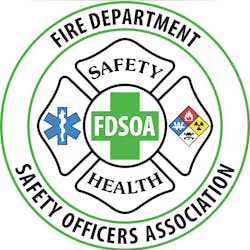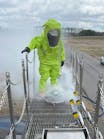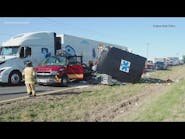FDSOA Symposium: NFPA Focused on Alternative Fuel Emergency Safety
Source Firehouse.com News
SCOTTSDALE, Ariz. – From alternative energy vehicles and heating systems, to apparatus to turn out gear, the National Fire Protection Association (NFPA) has a myriad of codes all designed to keep firefighters safe.
“Your workplace is the scene and these code are designed to keep you safe,” Russ Sanders, NFPA’s central regional director and the executive secretary of the NFPA/International Association of Fire Chiefs Metro Fire Chiefs’ Association said to a group of firefighter gathered for the Fire Department Safety Officers Association’s (FDSOA) Safety Symposium.
Sanders said NFPA has had codes regulating photovoltaic cells since 1984, back when solar power was nearly science fiction. They have been upgraded continuously over the years, all with the intent of keeping responders safe.
“Firefighters are going to be on roofs, so we have to have a way to de-energize power to those cells,” Sanders said, noting that voltage on solar panels has increased from 600 volts to 1,000-volts, more than enough to kill anyone who comes into contact.
Sanders also touted NPFA’s hybrid vehicle training which he said is available to all firefighters, free of charge, online, as it was paid for with a federal grant.
“It’s really phenomenal training,” Sanders said, noting that after decades in the fire service responding to thousands of car wrecks and fires, he didn’t understand the big fuss over hybrids. “Boy, was it eye opening,” he said. “If you cut that big orange cable, you are in some deep sh**,” he said.
Sanders commented that the hybrid training has now reached more than 50,000 people through train-the-trainer programs nationwide. The intent is to have every firefighter in the nation participate in the training.
And the training isn’t stopping there, Sanders said, noting that NFPA has the intent to roll out similar training to cover hybrid commercial vehicles, buses and public transportation systems.
“It’s not going to go away,” Sanders said of alternative fuels for vehicles, Sanders said. “The training has been extremely well received.”
NFPA is also planning on widening the circles for hybrid training to include tow truck drivers, utility workers, public works employees and hospitals who will all have to deal with victims of these kinds of crashes and mishaps and deal with the special circumstances, Sanders said.
Sanders also talked about alternative power sources for buildings and special considerations for green buildings. He used a case study of a green building in La Farge, Wis., at a dairy cooperative. The building was touted as a green building with solar panels and even denim for insulation. It was particularly challenging for the small volunteer fire department, which Sanders praised for their efforts and training on how to deal with the unusual construction materials and techniques.
The process of how ideas become code and standards was also part of Sanders’ presentation. He explained the process of how public comments and ideas from citizens as well as fire departments wind their way through the process to become code. He stressed that final codes are products of lots of thought, hard work and research.
Codes are finally adopted by consensus votes of members and are continually reviewed and refined, he said, encouraging firefighters to join in the process and make a difference.
“National fire codes are your tools,” Sanders said. “Make sure they are used and used properly. …It’s your workplace and it’s what you can use to keep yourselves safe.”
More from FDSOA:
- FDSOA's Apparatus Symposium Opens in Ariz.
- FDSOA Symposium: Diesel Emissions Standards Need not be so Scary
- FDSOA Symposium: NFPA 2015 Apparatus Standards Reviewed
- FDSOA Symposium: Politics Play a Role in Apparatus Purchasing
- FDSOA Symposium: Experts Field Apparatus Questions
- FDSOA Symposium: Detroit FD Weathers City's Bankruptcy
- FDSOA Symposium: Apparatus Design Is Important for ISO Ratings
- FDSOA Symposium: Drones Can Be Valuable Tools For Responders
- FDSOA Symposium: NFPA Focused on Alternative Fuel Emergency Safety
- FDSOA Symposium: Graham Lectures on True Risk Managment
- FDSOA Symposium: Pros and Cons of Thermal Imagers Discussed
- FDSOA Symposium: Maintenance is Key to Keeping Apparatus on the Road






